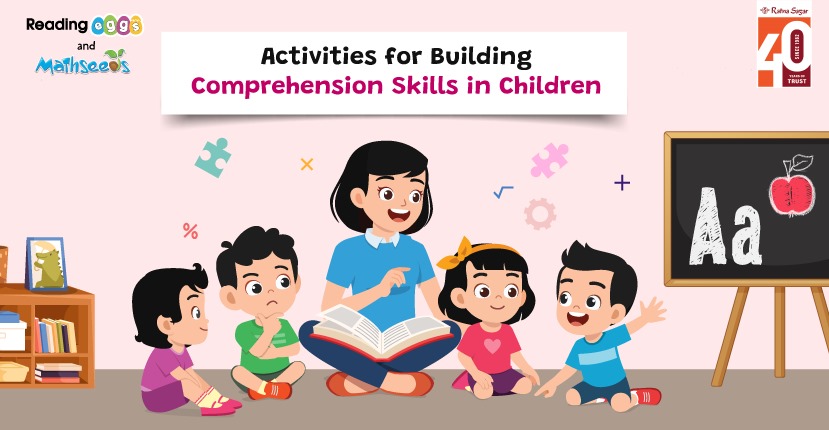
Listening comprehension is a crucial skill that forms the foundation of effective communication and learning. It’s more than just hearing words—it involves understanding, interpreting and responding to spoken language. For children, developing strong listening comprehension skills is essential, as it enhances their ability to follow instructions, engage in conversations and succeed academically. In this article, we will discuss various activities designed to build and strengthen listening comprehension skills in children. These activities are not only educational but also fun and engaging, making the learning process enjoyable for young minds.
The Importance of Listening Comprehension
Before diving into specific activities, it’s important to understand why listening comprehension is so vital. Listening comprehension:
- Enhances Communication: Effective communication depends on both speaking and listening. Good listeners can understand others’ perspectives, ask relevant questions and contribute meaningfully to discussions.
- Supports Academic Success: In the classroom, listening comprehension is key to following instructions, understanding lessons and participating in group work. It also aids in reading comprehension, as children learn to connect spoken and written language.
- Fosters Social Skills: Children with strong listening skills are better equipped to navigate social situations, build friendships and resolve conflicts.
- Encourages Critical Thinking: Listening comprehension involves processing information, making connections and drawing conclusions—skills that are essential for critical thinking.
Book 14 days FREE trial For UKG Maths Worksheet
How to Improve Comprehension Skills?
1. Storytelling Sessions
Objective: Improve attention to detail and recall skills.
Description: Storytelling is a powerful tool for enhancing listening comprehension. By listening to stories, children are exposed to new vocabulary, sentence structures and ideas.
Activity:
- Choose a variety of stories that are age-appropriate and engaging.
- After reading a story aloud, ask questions about the characters, plot and setting.
- Encourage children to retell the story in their own words. This helps reinforce their understanding and ability to recall details.
- For a more interactive experience, use props or visuals to accompany the story.
Variation: Ask children to predict what might happen next in the story, fostering active listening and critical thinking.
2. “Simon Says” Game
Objective: Enhance the ability to follow instructions.
Description: “Simon Says” is a classic game that requires children to listen carefully to instructions and respond only when the phrase “Simon says” is used.
Activity:
- Stand in front of the group and give instructions like “Simon says touch your nose” or “Simon says jump up and down.”
- If an instruction is given without saying “Simon says,” children should remain still. Those who move are out of the game.
- The game encourages children to pay close attention to the instructions and think before acting.
Variation: Add complexity by giving multi-step instructions, such as “Simon says touch your toes, then clap your hands.”
Book 14 days FREE trial For UKG Maths Worksheet
3. Listening Walks
Objective: Develop awareness of environmental sounds.
Description: A listening walk is an outdoor activity where children focus on the sounds around them, helping them become more attentive listeners.
Activity:
- Take a walk in a park, around the neighborhood, or even in the schoolyard.
- Ask children to close their eyes for a moment and listen to the sounds around them—birds chirping, leaves rustling, cars passing by.
- After the walk, discuss what they heard. Ask questions like, “What sound did you hear the most?” or “What sound was the loudest?”
- This activity helps children learn to differentiate and identify sounds in their environment.
Variation: Create a “sound scavenger hunt” where children have to listen for specific sounds, like a barking dog or a honking car.
4. Listening to Rhymes and Poems
Objective: Improve rhythm recognition and auditory memory.
Description: Music is a universal language that can significantly enhance listening skills. Songs with lyrics, especially those with repetitive phrases, help children focus on rhythm, pronunciation and word recognition.
Activity:
- Play a song and ask children to listen carefully to the lyrics.
- Discuss the song’s message and ask questions about specific phrases or words.
- Encourage children to sing along. Repetition helps reinforce what they’ve heard.
Variation: Use songs in different languages to expose children to new sounds and words, broadening their auditory experience.
5. Audio Books and Podcasts
Objective: Enhance concentration and ability to visualise spoken content.
Description: Audiobooks and podcasts offer a different medium for children to practice listening. Without the visual cues from a book or screen, children must rely entirely on their listening skills to understand the content.
Activity:
- Choose age-appropriate audiobooks or podcasts that align with the child’s interests.
- After listening, engage the child in a discussion about the content. Ask open-ended questions to encourage them to express their thoughts and understanding.
- For younger children, select audiobooks with sound effects and character voices to make the experience more engaging.
Variation: Create a “listening journal” where children can draw or write about what they heard, reinforcing their comprehension through creative expression.
Book 14 days FREE trial For UKG Maths Worksheet
To enhance children’s comprehension abilities, consider using Reading Eggs and Mathseeds. It is specifically designed to help children improve their comprehension proficiency. Here are some key features of the program:
Reading Eggs and Mathseeds Library
- Offers around 3,800 books across 13 diverse genres.
- Each book includes engaging quizzes for added enjoyment.
- Provides a wide range of stories for children to choose from.
Lexile Level Filter and Read-Aloud Audio Feature
- The Lexile level filter helps kids find books that match their reading proficiency.
- The read-aloud audio feature assists struggling readers.
- Allows adults to read stories to children and gradually transition as their reading skills grow.
Takeaway
Building listening comprehension skills in children is an essential part of their overall development. Through engaging and varied activities, children can learn to listen more effectively, process spoken information and respond appropriately. These skills are crucial for academic success, social interactions and lifelong learning.
Book 14 days FREE trial For UKG Maths Worksheet
Incorporating activities like storytelling, music and interactive games can make listening practice enjoyable and impactful. By fostering strong listening skills early on, we equip children with the tools they need to communicate effectively, think critically and succeed in a complex and interconnected world.

